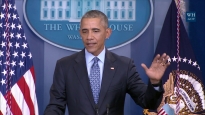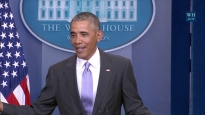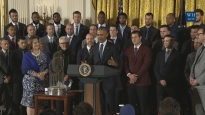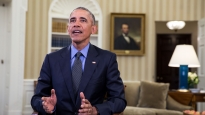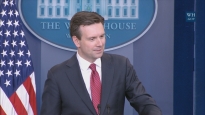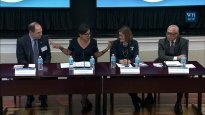Weekly Address: Protecting the Middle Class & the Economy
December 11, 2010 | 4:55 | Public Domain
The President strongly urges both parties in Congress to pass the compromise on tax cuts, unemployment insurance, and job creation. Not doing so would hurt the middle class, those struggling to find work, and the economy itself.
WEEKLY ADDRESS: President Obama Strongly Urges Passage of the Framework Agreement on Middle Class Tax Cuts
WASHINGTON – In this week’s address, President Obama strongly urged both houses of Congress to pass the framework agreement on middle class tax cuts. This is a good deal for the American people, and they are counting on Washington to get this done. A failure to do so would not only result in tax hikes on middle class families and a loss of unemployment insurance for those hardest hit by this recession, but it would also risk weakening our economic recovery.
The audio and video of the address will be available online at www.whitehouse.gov at 6:00 a.m. EDT, Saturday, December 11, 2010.
Remarks of President Barack Obama
Weekly Address
The White House
December 11, 2010
Right now, there’s a big debate taking place in Washington that will affect how much you pay in taxes next year. If Congress doesn’t act, tax rates will automatically go up for just about everyone in our country. Typical middle class families would end up paying an extra $3,000.
That’s unacceptable to me. Not when we know that it’s the middle class that was hit the hardest by the recession. And not when we know that taking this money out of the pockets of working people is exactly the wrong thing to do to get our economy growing faster. Economists tell us that this tax hike on working families could actually cost us well over a million jobs.
That’s why I’ve been fighting so hard to cut middle class taxes. And that’s why I brought both Democrats and Republicans to the table – to put together a compromise, and work through our differences, so we could get this done.
Now, the Republicans in Congress strongly favored permanent tax breaks for the wealthiest taxpayers and the wealthiest estates, most of which would go to millionaires and even billionaires. But I didn’t believe that these tax cuts were worth the cost. They’d add to our deficits without really boosting the economy.
I believed that the best way to help the economy, and working families, was to keep middle class tax rates low, and cut taxes for working parents, college students, and small businesses. And I believed that with millions of people looking for jobs, it would be a terrible mistake to end unemployment insurance – not only for people who are out of work, but for our entire economy.
So we hammered out a deal that reflects ideas from both sides. It wasn’t easy, and it’s by no means perfect. And as with any compromise, everybody had to live with elements they didn’t like. But this is a good deal for the American people. The vast majority of the tax cuts in this plan will help the middle class, including a new cut in payroll taxes that will save the average family about $1,000. And as this plan is debated in Congress, what I want to make clear is the real difference it will make in people’s lives.
It’s going to make a difference for a single mom with two kids in Ohio working as a cashier. With this plan, she’d get a new payroll tax cut and a bigger child tax credit together worth more than $2,300.
It’s going to make a difference for a couple in Florida earning about $50,000 and trying to put one of their two kids through college. They’d save more than $4,000 because of the middle class tax cuts – including a $2,500 tax credit to go toward college tuition.
And it’s going to make an enormous difference for people looking for jobs. For many of these families, emergency unemployment insurance is the last line of defense between hardship and catastrophe. And I’d point out, if these folks stop spending money, it will also hurt businesses, which will hurt hiring, which will damage our recovery.
So this plan is going to help millions of families to make ends meet, through tax cuts and unemployment insurance for people who’ve lost their jobs by no fault of their own. And we included tax relief for businesses, too – making it easier for them to invest and expand. All told, this will not only directly help families and businesses. By putting more money in people’s pockets, and helping companies grow, we’re going to see people being able to spend a little more, we’re going to spur hiring – we’re going to strengthen our entire economy.
Now, I recognize that many of my friends in my own party are uncomfortable with some of what’s in this agreement, in particular the temporary tax cuts for the wealthy. And I share their concerns. It’s clear that over the long run, if we’re serious about balancing the budget, we cannot afford to continue these tax breaks for the wealthiest taxpayers – especially when we know that cutting the deficit is going to demand sacrifice from everyone. That’s the reality.
But at the same time, we cannot allow the middle class in this country to be caught in the political crossfire of Washington. People want us to find solutions, not score points. And I will not allow middle class families to be treated like pawns on a chessboard.
The opportunity for families to send their kids to college hinges on this debate. The ability of parents to put food on the table while looking for a job depends on this debate. And our recovery will be strengthened or weakened based on the choice that now rests with Congress.
So I strongly urge members of both parties to pass this plan. And I’m confident that they will do the right thing, strengthening the middle class and our economic recovery.
Thank you.
|
January 18, 2017
|
January 17, 2017
|
January 16, 2017
|
January 16, 2017
|
|
January 14, 2017
|
January 13, 2017
|
January 13, 2017
|
January 12, 2017
|
